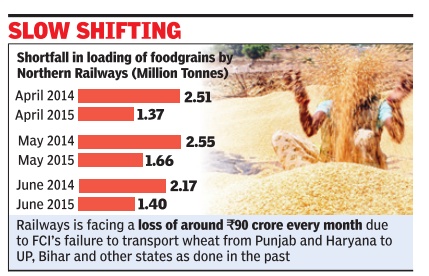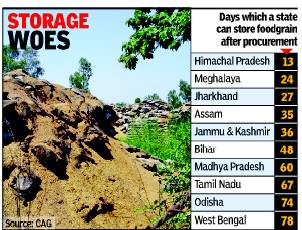Foodgrains and their management: India
This is a collection of newspaper articles selected for the excellence of their content. |
The states’ capacity to store foodgrains after procurement
Pradeep Thakur TNN 2013/06/16
Most states can’t stock grains beyond 75 days
New Delhi: A CAG report on foodgrain management in the country paints a grim picture on the states’ capability to manage operational stock of foodgrain. Out of 31 states and Union territories, eight have storage capacities of 120 days.
Most poor states such as Bihar, Jharkhand, Madhya Pradesh, Odisha, West Bengal, Tamil Nadu and Assam do not have the capacity to handle stocks for more than 13-75 days. HP, Meghalaya, J&K, Jharkhand and Assam cannot even handle their stock for a month. Audit reveals that more than 1 lakh tonne of wheat worth Rs 122 crore was damaged in Punjab and Haryana alone in the last two years.
Despite the fact that over a hundred lakh tonnes of foodgrain stocks as old as 2007-08 were lying in the custody of states, the government continued on a procurement drive. Also, at a time when the government’s spend on food subsidy was estimated to touch Rs 1.25 lakh crore, it exported foodgrain from its overflowing reserves at subsidized rates causing loss of over Rs 1,700 crore (in 2012-13).
2015: Low offtake
The Times of India, Jul 02 2015

Mahendra Singh
Rlys takes `300cr hit as states cut grain buy
Reluctance of Uttar Pradesh, Bihar and West Bengal to avail subsidized foodgrains from the Food Corporation of India (FCI) has put the railways in a spot. The national transporter is suffering losses of around Rs 90 crore every month as the FCI has drastically cut down loading of foodgrains, sources said.
The substantial cut in loading target is due to the food ministry and FCI's failure to take up the issue with the these states, which have the maximum number of poor and have been the biggest receiver of subsidized foodgrains, said a top government source. He said the loading target was slashed by the FCI without prior information to the railways that led to large number of rakes lying idle.The FCI attributed it to a sudden cut in off-take of foodgrains by the states. A senior official found the food ministry and FCI's indifference to the issue intriguing. “At a time when the FCI has a stock of around 24 million tonnes of wheat procured under re laxed norms and a shorter shelf life of 8 to 10 months, the Centre and FCI must act to transport grains from Punjab and Haryana to consumer states at the earliest,“ he said. “Foodgrain loading of railways is at an all-time low and its wagon capacity is being wasted,“ said an official adding the railways has already lost around Rs 300 crore in three months.
To tame onion prices, govt extends stock limit
The Cabinet extended the stock limit on onion for one year to July 2016 in its bid to curb the rise in the commodity's prices. The validity of the order that empowers states to impose stock limits on traders for holding onion and ban hoarding beyond the set limit expires on Thursday. The decision will enable state governments take effective de-hoarding measures under the Essential Commodities Act. Oly three states Odisha, West Bengal and Telangana have so far fixed the stock limit on potatoes and onions.
See also
Food and Civil Supplies: India <> Food and Civil Supplies, hoarding of: India <> Foodgrain management: India
